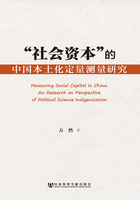
Abstract
The issue of social capital has gained increasing importance in political science since the late 20th century. Many theoretical and empirical studies show that social capital facilitates collective actions. Therefore, social capital is used as an important explanatory variable for political phenomena and political development. A set of good and effective indicators is the prerequisite to measuring social capital accurately and to analyzing academic problems in political science in both qualitative and quantitative studies. Based on many cross - cultural empirical studies and theoretical achievements, this book will build a multi-dimensional measurement of social capital which offers clear structure and indigenization.
The indicators are based on the concept which Robert D. Putnam defines. Putnam is a famous scholar for studying social capital in political science. The indicators include social networks, norms and trust. “Social networks”include association networks, community networks and interpersonal networks. “Norms”refers to the public norms such as a sense of civic duties, and interpersonal norms like reciprocity. “Trust”includes the general and political trust in public area, and interpersonal genetic, neighborhood, industry trust. Some items of them, like citizen observe public order and political trust, are designed for political studies and Chinese society.
Using these new indicators, this book tries to answer two questions: How much social capital in there in the Chinese society, and what features does it have? Does the hypothesis about social capital and political participation hold true in the Chinese society? The main data in the book come from a large national survey based on probability sampling, called Civic Culture and Harmonious Society conducted in 2008 by the Research Center for Contemporary China, Peking University. The research result proves once again that social capital facilitates social, political and economic development.